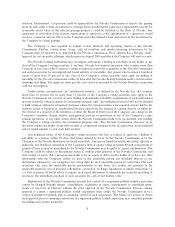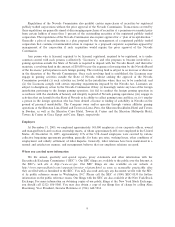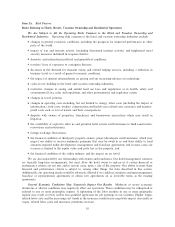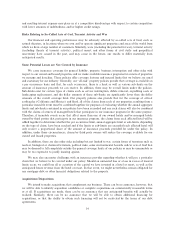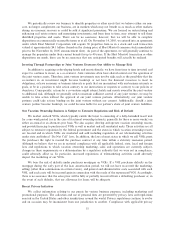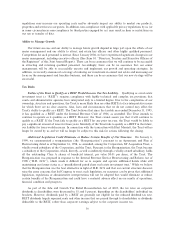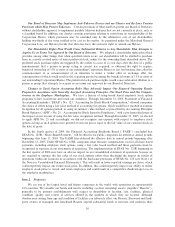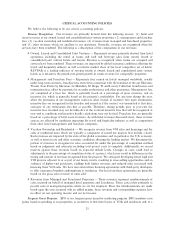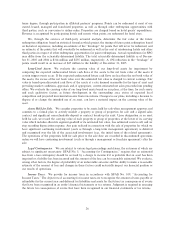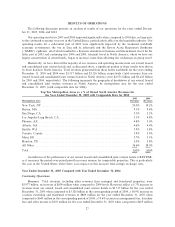Starwood 2005 Annual Report Download - page 22
Download and view the complete annual report
Please find page 22 of the 2005 Starwood annual report below. You can navigate through the pages in the report by either clicking on the pages listed below, or by using the keyword search tool below to find specific information within the annual report.Our Board of Directors May Implement Anti-Takeover Devices and our Charter and By-Laws Contain
Provisions which May Prevent Takeovers. Certain provisions of Maryland law permit our Board of Directors,
without stockholder approval, to implement possible takeover defenses that are not currently in place, such as
a classiÑed board. In addition, our charter contains provisions relating to restrictions on transferability of the
Corporation Shares, which provisions may be amended only by the aÇrmative vote of our shareholders
holding two-thirds of the votes entitled to be cast on the matter. As permitted under the Maryland General
Corporation Law, our Bylaws provide that directors have the exclusive right to amend our Bylaws.
Our Shareholder Rights Plan Would Cause Substantial Dilution to Any Shareholder That Attempts to
Acquire Us on Terms Not Approved by Our Board of Directors. We adopted a shareholder rights plan which
provides, among other things, that when speciÑed events occur, our shareholders will be entitled to purchase
from us a newly created series of junior preferred stock, subject to the ownership limit described above. The
preferred stock purchase rights are triggered by the earlier to occur of (i) ten days after the date of a public
announcement that a person or group acting in concert has acquired, or obtained the right to acquire,
beneÑcial ownership of 15% or more of our outstanding Corporation Shares or (ii) ten business days after the
commencement of or announcement of an intention to make a tender oÅer or exchange oÅer, the
consummation of which would result in the acquiring person becoming the beneÑcial owner of 15% or more of
our outstanding Corporation Shares. The preferred stock purchase rights would cause substantial dilution to a
person or group that attempts to acquire us on terms not approved by our Board of Directors.
Changes in Stock Option Accounting Rules May Adversely Impact Our Reported Operating Results
Prepared in Accordance with Generally Accepted Accounting Principles, Our Stock Price and Our Competi-
tiveness in the Employee Marketplace. We have a history of using broad based employee stock option
programs to hire, incentivize and retain our workforce. Through December 31, 2005, Statement of Financial
Accounting Standards (""SFAS'') No. 123, ""Accounting for Stock-Based Compensation,'' allowed companies
the choice of either using a fair value method of accounting for options, which would have resulted in expense
recognition for all options granted, or using an intrinsic value method, as prescribed by Accounting Principles
Board Opinion (""APB'') No. 25, ""Accounting for Stock Issued to Employees,'' with a pro forma disclosure of
the impact on net income of using the fair value recognition method. Through December 31, 2005, we elected
to apply APB No. 25 and accordingly, we did not recognize any expense with respect to employee stock
options as long as such options were granted at exercise prices equal to the fair value of our common stock on
the date of grant.
In the fourth quarter of 2004, the Financial Accounting Standards Board (""FASB'') concluded that
SFAS No. 123R, ""Share-Based Payment,'' will be eÅective for public companies for interim or annual periods
beginning after June 15, 2005. The FASB later deferred the eÅective date to annual periods beginning after
December 15, 2005. Under SFAS No. 123R, companies must measure compensation cost for all share-based
payments, including employee stock options, using a fair value based method and these payments must be
recognized as expenses in our statements of operations. The implementation of SFAS No. 123R beginning in
the Ñrst quarter of 2006 may have an adverse impact on our consolidated statement of operations because we
are required to expense the fair value of our stock options rather than disclosing the impact on results of
operations within our footnotes in accordance with the disclosure provisions of SFAS No. 123 (see Note 1 of
the Notes to Consolidated Financial Statements). This will result in lower reported earnings per share, which
could negatively impact our future stock price. In addition, this could negatively impact our ability to utilize
employee stock plans to recruit and retain employees and could result in a competitive disadvantage to us in
the employee marketplace.
Item 2. Properties.
We are one of the largest hotel and leisure companies in the world, with operations in approximately
100 countries. We consider our hotels and resorts, including vacation ownership resorts (together ""Resorts''),
generally to be premier establishments with respect to desirability of location, size, facilities, physical
condition, quality and variety of services oÅered in the markets in which they are located. Although
obsolescence arising from age and condition of facilities can adversely aÅect our Resorts, Starwood and third-
party owners of managed and franchised Resorts expend substantial funds to renovate and maintain their
18


